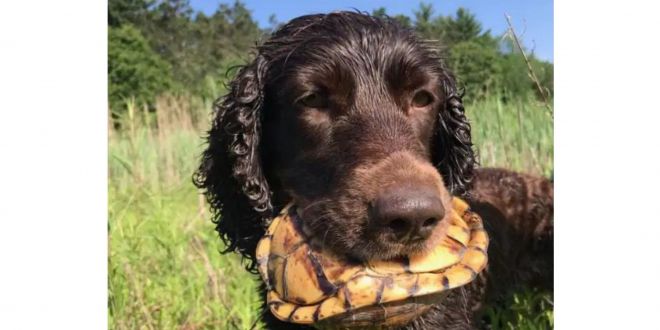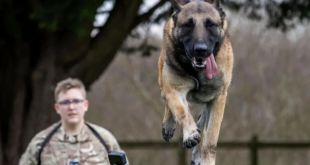He mentioned it to a few people, and soon, biology teachers from the University of North Carolina started reaching out to him and asking whether he would take their students out so they could put transmitters on the turtles to study them.
Several years later, the outings were so successful, Rucker was fielding calls from wildlife veterinarians and zoologists who were studying turtle populations.
“Because turtles aren’t easily detected in the wild by the human eye, I could see that I was on to something,” said Rucker, now 73.
He got more spaniels and used golf balls and bacon grease to train them as turtle trackers.
Now, two decades later, Rucker’s spaniels are a highly in-demand, specialized team trained to sniff out box turtles by following their urine trails.
The dogs — Yogi, Ruger, Jenny Wren, Lazarus, Scamp, Skeeter and Rooster — travel across the country with Rucker helping to track turtle populations and identify threats and diseases.
Box turtles, which can live to be as old as 100, are fascinating to scientists and conservationists for various reasons, including they are vulnerable to environmental changes, so they are indicators of how ecosystems are faring around the world.
Every spring and summer for the past two decades, Rucker is on the road with his dogs, working for university biologists and state wildlife conservation teams. Rucker and the spaniels travel by van from their home in Montana and live in a tent in the environment where they work: off dirt roads in isolated grasslands, finding box turtles that are potentially in danger.
When the dogs locate turtles hidden in tall grass, they alert him by wagging their tails and barking, then carefully pick up the turtles in their mouths and carry them to him.
Wildlife conservationists working with Rucker will often swab the turtles’ mouths to test for diseases like herpes and also ranavirus — which has a high mortality rate and strikes reptiles, amphibians and fish.
The disease has been found in turtles in states throughout the East and Midwest, including Maryland, Pennsylvania and Illinois, and has devastated populations of box turtles. It is not harmful to dogs.
When box turtles are tested for ranavirus, they are generally tagged with tiny transmitters on their shells so their future movements — slow as they might be — can be followed and studied by wildlife experts.
Sharon Deem, director of the Saint Louis Zoo Institute for Conservation Medicine in Missouri, was alarmed last year when she learned that the fast-moving ranavirus had shown up at the Saint Louis Zoo WildCare Park.
After four water turtles were diagnosed with ranavirus, Deem called in Rucker and his dogs to help retrieve grassland turtles, as she was concerned the disease might have spread to them.
Rucker and his dogs camped out in the grasslands for a few days and found three box turtles that Deem and her zoo team were able to swab (they tested negative for ranavirus) and tag in the hope that they would lead them to other turtles camouflaged in the brush and grass.
Then Rucker packed up and headed to another turtle-tracking job in Illinois, where he spent several weeks working with the Illinois Department of Natural Resources, helping to track ornate box turtles that are threatened because of habitat loss. Rucker’s dogs found about 60 turtles that were then outfitted with transmitters so wildlife officials can get a better handle on their populations, he said.
Deem, 57, said tracking data about the turtles helps wildlife advocates to develop management practices that can aide in species survival.
The turtles also act as sentinels, an indicator of the health of the ecosystem around them.
“Turtles are long-lived, slow to reproductive maturity and are very affected by environmental change,” she said. “They’re an indicator of ecosystem health, not only for turtles, but for other animals and even human health. It’s crucial that we protect them.”
While box turtles can live an entire century, the average life span is 25 to 30 years. Ornate box turtles begin to reproduce around age 20.
Other dogs have been trained to find sea turtle eggs, and a few zoos have taught canines to find box turtles, but Boykin spaniels are uniquely suited to hunt for turtles because they have soft mouths and a keen sense of smell, Rucker said.
When he and his girlfriend, Karen Judge, train dogs at home in Montana, they first hide painted golf balls for them to find, then move up to turtle shells made of fiberglass and slathered in bacon grease, said Rucker. From there, the dogs are trained to pick up the scent of a turtle’s urine trail in the wild.
“They’re also eager to please,” said Rucker. “They love nothing more than to find a turtle and proudly bring it to me.”
The spaniels play a vital role in Illinois’s turtle conservation efforts, said state herpetologist Scott Ballard, who has worked with Rucker off and on in the field since 2011.
He said Rucker’s dogs can detect turtles hiding in the grass quickly, allowing wildlife teams to attach transmitters on them in greater numbers.
“Every three days, we put their GPS points into a database, and you can almost draw a line to see where they’re going,” he said. “A male may move a mile a day, looking for females to mate, while the females are more sedentary. They’re looking for blackberries and strawberries and storing up fat to produce eggs.”
Whenever Ballard watches Rucker work with his dogs in the wild, he is struck by their teamwork, he said.
“The dogs circle the area and pick up the scent trail, and not long after that, they come across a turtle and start barking and pick it up,” he said.
“If we didn’t have John’s dogs, it would just be serendipitous to find an ornate box turtle,” added Ballard. “They’re really hard to spot.”
For Rucker, nothing matches having one of his dogs bring him a turtle — head and legs tucked inside its shell — and dropping it gingerly at his feet.
“They hunt for me out of love,” he said. “And I love them, and I love turtles and grasslands. It’s a perfect match.”
Source: Washington Post, Not edited by DogExpress staff
 DogExpress
DogExpress
























 in Chandigarh, India.
in Chandigarh, India. 

